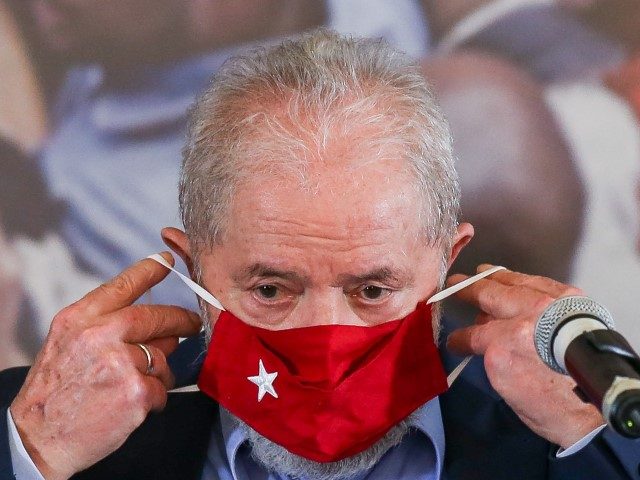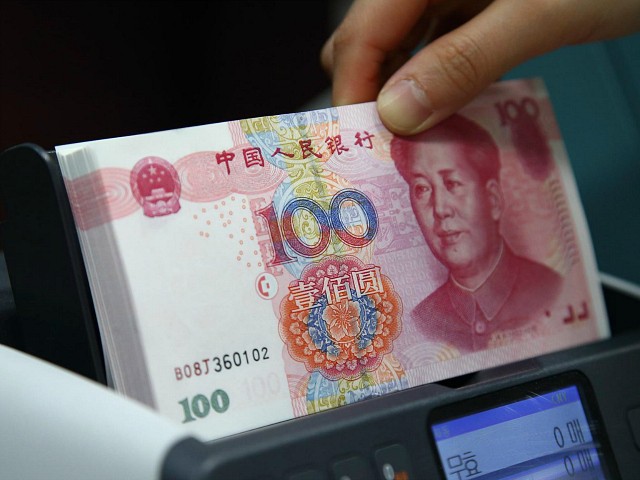Brazil’s radical socialist President Luiz Inácio Lula da Silva departed his country for Shanghai on Tuesday, potentially preparing to engage in “cooperation” with the Chinese Communist Party under the Belt and Road Initiative (BRI), according to Chinese state media.
Lula is expected to land in Shanghai and travel to Beijing, the national capital, for meetings with genocidal communist dictator Xi Jinping on Friday. While commercial interests – deals to bring Chinese investment into Brazil and expand China’s domination of Brazil’s agriculture exports – are at the top of the agenda, the socialist president is also expected to discuss issues of mutual geopolitical interest. The Chinese state-run Global Times reported that Lula is planning to propose greater Brazilian involvement in the ongoing Russian invasion of Ukraine through the creation of a “peace club” with China.
Prior to his victory in the October 2022 presidential election, Lula insulted Ukrainian President Volodymyr Zelensky as a “nice comedian … as responsible as [Vladimir] Putin for the war” and accused the United States of exacerbating tensions in the region. Shortly after his inauguration in January, despite having exhibited personal distaste for Zelensky in public, Lula offered to mediate talks between Zelensky and Putin.
Lula became president this year after a fraught political campaign in which he attacked conservative opponent Jair Bolsonaro by falsely branding him a “pedophile” and having his campaign accuse the then-president of cannibalism. Brazil’s top election authority did not censor Lula’s “pedophile” statements but prevented the Bolsonaro campaign, and independent journalists, from discussing the fact that Lula had been convicted on multiple appeals of taking bribes during his past presidential terms. Lula was allowed to run for president after the nation’s Supreme Federal Tribunal (STF), which shares members with the election authority, overturned his more than 20-year-long sentence on vague procedural grounds in 2021.

Brazilian ex-president (2003-2011) Luiz Inacio Lula da Silva arrives at the Federal Police headquarters where he is due to serve his 12-year prison sentence, in Curitiba, Parana State, Brazil, on April 7, 2018.(HEULER ANDREY/AFP via Getty Images)
The Brazilian president had planned his visit to China for March but was forced to delay the trip after being diagnosed with pneumonia. It is Lula’s first visit to China since being inaugurated into office in January, though he had an extensive record of bringing his country closer into China’s orbit during his first two terms in office from 2003 to 2011. Lula most notably spearheaded efforts to establish the economic and security coalition BRICS alongside the other member nations: Russia, India, China, and South Africa.
On Lula’s itinerary this week is the ceremony in Shanghai on Wednesday to place Lula’s top protege, disgraced former Brazilian President Dilma Rousseff, at the helm of the BRICS Development Bank, an institution intended to compete with the more established World Bank and International Monetary Fund (IMF).

Former President Luiz Inacio Lula da Silva, with impeached former president Dilma Rousseff, gestures to supporters at the headquarters of the Metalworkers’ Union where a Catholic Mass was held in memory of his late wife Marisa Leticia on April 7, 2018, in Sao Paulo, Brazil. An arrest warrant was issued on Thursday for da Silva to serve a 12-year jail term for corruption. (Victor Moriyama/Getty Images)
According to the Global Times, the BRI Chinese debt trap scheme will also feature as a point of discussion in Lula’s meetings. Regime-approved “experts” listed the topics Lula will address in China as including “not only traditional areas like trade and investment, but also fields like finance, anti-poverty, cooperation under the frame of the Belt and Road Initiative (BRI), as well as joint mediation over the world-concerned Ukraine crisis.”
The BRI is a Chinese scheme in which Beijing offers poor countries predatory loans to be used for the construction of ports, roads, railways, and other infrastructure projects. The countries take out the loans, often under secretive and risky terms, and use them to pay Chinese companies to work on the projects. When the countries can no longer pay back the loans, China seizes the projects or otherwise uses its leverage to erode the country’s sovereignty, as most prominently occurred in Sri Lanka when Beijing took over the critical Hambantota port for nearly 200 years in 2021.
While Bolsonaro had touted himself as an enemy of communism, his administration was largely friendly to China. During his last months in office, his ambassador to China, Paulo Estivallet de Mesquita, told the Global Times that Bolsonaro had a “great interest” in the BRI.
That “great interest” may evolve into membership under Lula, though Brasilia has not publicly mentioned the deal and Beijing answered open-endedly when asked about Brazil potentially joining the BRI.
“The BRI is a completely open and transparent cooperation initiative,” Chinese Foreign Ministry spokesman Wang Wenbin said on Monday when asked about Brazil, according to the Global Times. “We are willing to work with all members of the international community, to jointly promote cooperation for construction of the Belt and Road, and to pay our efforts to promote joint development for all countries.”
While not mentioning the BRI specifically, Lula emphasized that he expected his visit to China to yield a dramatic increase in commercial activity between the two countries – including Chinese investment in infrastructure.
Lula told the state-owned A Voz do Brasil radio program on Monday that he intended to invite Xi Jinping to Brazil while he was in China so that Xi could see “the projects that we have of interest to Chinese investment” with his own eyes.
“We want to build a partnership with the Chinese so that they can invest in things that don’t exist [yet] – a new highway, a new railroad, a new hydroelectric plant – investments that mean something new for Brazil,” Lula said.
The Brazilian newspaper O Globo on Tuesday listed several projects that Lula will reportedly pursue in China, according to unnamed “sources.” Among them were the potential for a Chinese company to purchase an abandoned Ford factory in Bahía, the sale of 20 aircraft to China built by the Brazilian firm Embraer, and the sale of 280 trucks built by the Chinese company JAC to the Brazilian food company Seara. The sources told O Globo that Lula’s personal involvement in some of these deals, which had been in talks for months, was necessary to get them over the finish line.
Many of these deals are likely to be conducted in Chinese yuan, not the U.S. dollar. Lula has made limiting ties with America and dependency on the U.S. dollar a priority of his administration, going so far as to propose the creation of a continental currency alongside other South American economies such as Argentina and Chile. In late March, during the time in which Lula was originally scheduled to visit China, Beijing and Brasilia announced an agreement to use the Industrial and Commercial Bank of China (ICBC) to conduct trade in yuan, eliminating the need to convert local currencies to the U.S. dollars to make purchases. The decision will likely affect tens of billions of dollars in trade, as China is Brazil’s largest trade partner.


COMMENTS
Please let us know if you're having issues with commenting.